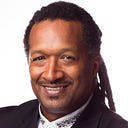Policing in the US: Imagining a Better Future for Carlos Ingram Lopez
Welcome to our blog series on policing in the US, and our dreams for what community safety can look like.
In Memory of Carlos Ingram Lopez
Carlos Ingram Lopez, a 27-year old cooking school graduate, is a Latinx man who lost his life on April 21, 2020 at the hands of police officers in a tragic scenario that mirrored the death of George Floyd. During the encounter, officers restrained him face-down for 12 minutes, with Lopez crying out for his grandmother, pleading for water, apologizing, and stating that he can’t breathe.
Officers supposedly responded to a disorderly conduct call, and found Lopez unclothed and acting erratically. There is harrowing bodycam footage where officers can be heard yelling within barely a minute of arriving on the scene, “Get on the fucking ground.” Lopez can be heard panting, “OK, please, please.” Then officers can be heard yelling, “I will taze you, mother fucker” either to Lopez or his grandmother who was crying and screaming in horror.
But why would the response to a non-violent, unarmed man be to send police officers who then use force to restrain him? Why not send mental health experts to the scene (even if accompanied by police officers)? Tucson Police Chief Chris Mangus offered his resignation acknowledging that his department failed to disclose the death in time (it took two months) and that the three officers — who resigned before the video was released — violated department policy.
Lopez was not Black, but his case falls in line with what the Black Lives Matter movement has been fighting for most vocally over the past few months: dealing with police brutality, perhaps by defunding, reforming, or re-imagining policing in our communities.
Imagining New Possibilities
What would have happened if there had been a social worker, mental health professional or a trained de-escalation officer responding to the call about Lopez? Perhaps they could have helped calm Lopez down or coach him through some self-regulation strategies. Maybe they could have communicated with his grandmother (who is the one who called the police) or had a Spanish translator on the scene.
Either way the overall aim would be to de-escalate to the situation. With this, oftentimes the focus is on calming down the person the police are being called on — but how about the officers themselves? Perhaps a mental health specialist can help calm them down as well any crowd that formed in observance of a situation as it’s happening. Then maybe — just maybe — Lopez might be alive today.
The Manhattan Institute, and many others, have produced exhaustive lists of ideas of how to reform police departments, including expanding use of body cameras, limiting no-knock warrants, hiring a more diverse force, and augmenting current training practices. But in the grand scheme of things, when these measures have been implemented in the past, they haven’t been effective in stopping police brutality.
As it stands now, police spend about seven times as many training hours on gun usage, and six times as many on defensive tactics as they do on de-escalation and crisis intervention. But those are central parts of the community safety work they are charged with doing! Considering expanding the roles of other public/community servants to respond in situations where police might not provide the best response could look like this… “Someone is behaving erratically & in harm’s way. Imagine texting a number & an unarmed urgent responder trained in behavioral and mental health comes within 5 minutes. An hour later that person is safe & getting the support they need.” Isn’t that what Carlos Ingram Lopez needed?
Black Lives Matter + Carlos Ingram Lopez
Lopez was not Black, but his murder should be of critical importance to the Black Lives Matter movement. The problem with policing goes beyond excessive force and unreliable training, but ties back into the roots of racism and implicit bias in our country’s foundation. Black and Brown folks experience racism very differently, but imagining a better tomorrow requires ALL of us to care about and respond to the deaths of innocent people at the hands of police, whether they look like us or not.
Check back soon to see our next post on Policing in the US: Imagining a Better Future!
